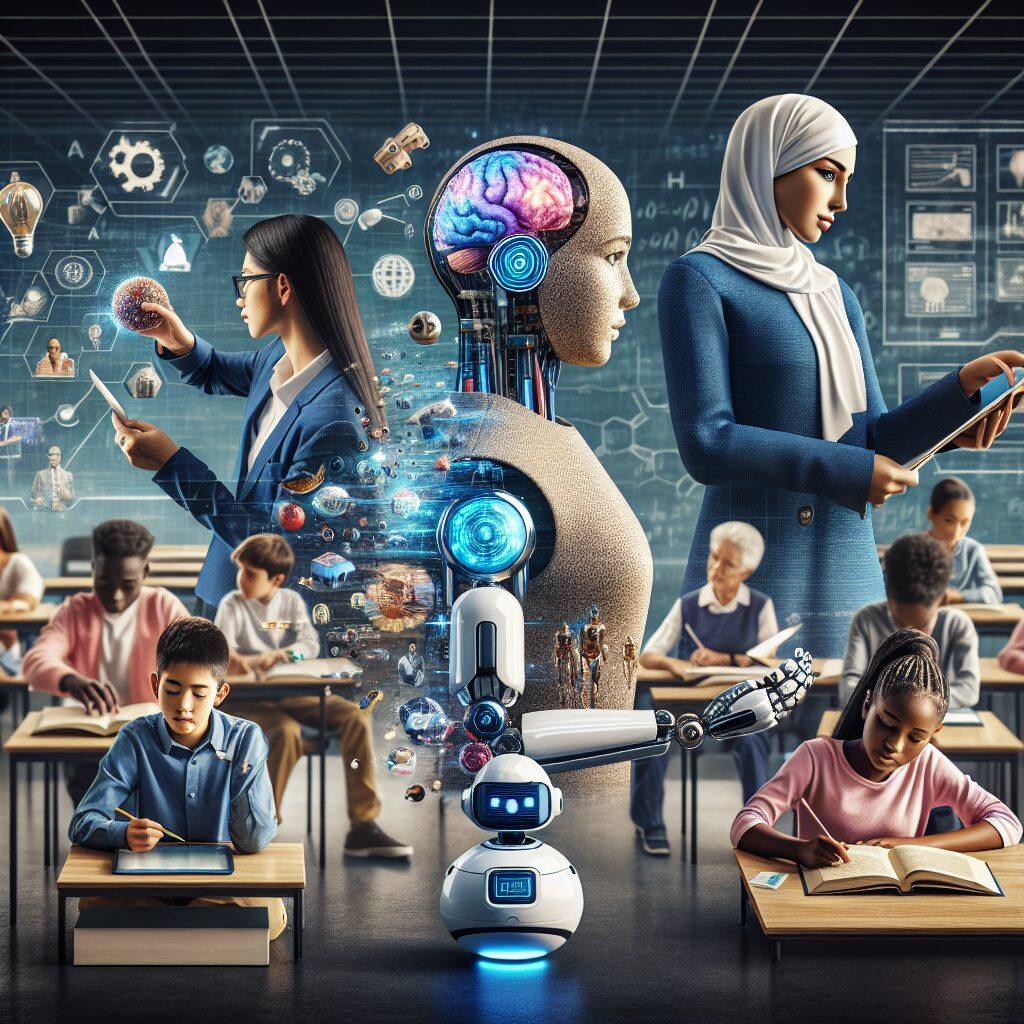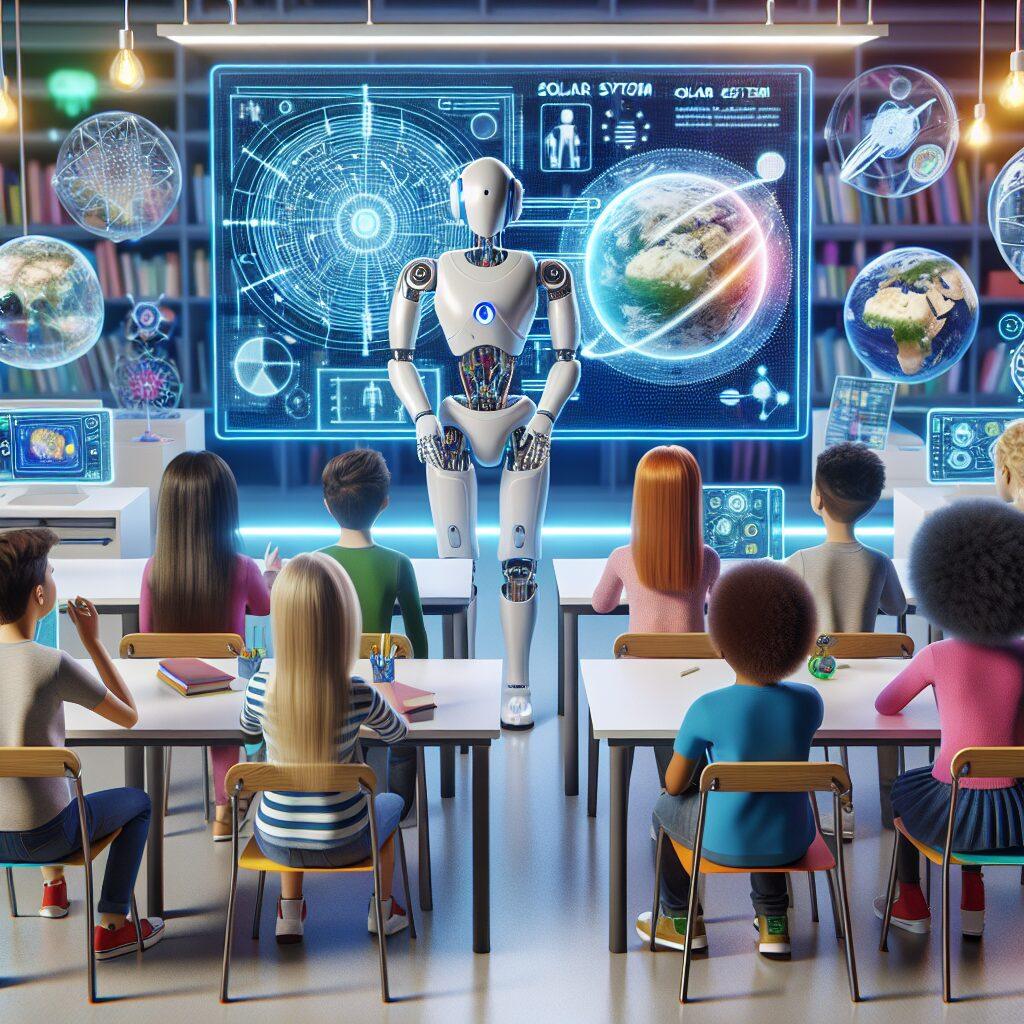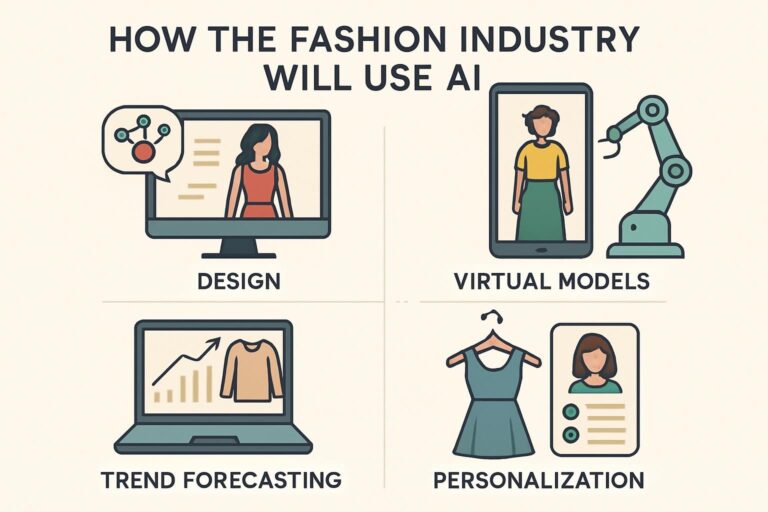5 Best AI Case Studies in Education That Will Blow Your Mind

AI in Education
AI in Education is revolutionizing the way in which in which school college students examine by providing tailored finding out experiences that cater to the individual needs of each pupil. By analyzing data on school college students’ finding out sorts, tempo, and therefore preferences, AI in Education methods can customise curricula, counsel belongings, and therefore even alter educating methods in precise time to optimize finding out outcomes.
This diploma of customization ensures that no pupil is left behind however of a one-size-fits-all technique, fostering a additional inclusive and therefore environment friendly tutorial setting.
Hey there! Ever been puzzled about how artificial intelligence (AI) is shaking up the teaching world? Seize an espresso, and therefore let’s dive into some jaw-dropping AI case evaluation in teaching that’ll make you go, “Whoa, I want faculty was like that after I was a child!”
1. Customized Studying with Knewton

Alright, buckle up, as a results of Knewton is solely the tip of the iceberg on the subject of AI-powered education. This nifty platform makes utilize of algorithms that are sharper than a coach’s crimson pen, adapting in real-time to each pupil’s effectivity.
Picture this: a digital tutor that not solely is conscious of what you’re good at, however moreover your Achilles’ heel in algebra, and therefore tailors courses solely for you. It’s like having a personal Yoda in your pocket, minus the inexperienced ears and therefore cryptic advice. With Knewton, gone are the instances of one-size-fits-all lesson plans; it’s all in regards to the bespoke tutorial journey now.
Image this: A classroom is a spot the place every scholar learns at their very private tempo on account of AI! Knewton is making that occur by analyzing scholarly information and therefore customizing classes. Consider it a private tutor that is — really aware of your strengths and therefore weaknesses.
🧠 Enjoyable Truth: Do you already know Knewton began as a simple concept to personalize checking out? Now, it’s — honestly remodeling lecture rooms worldwide!
2. Automating Administrative Duties with IBM Watson
Continuing on the theme of AI-driven personalization in education, let’s delve deeper into the transformative potential of such utilized sciences. With the blending of AI methods like IBM Watson, educators are discovering that they’re going to significantly minimize again the time spent on administrative duties, much like grading assignments and therefore managing pupil inquiries.
This effectivity not solely frees up invaluable time for lecturers to present consideration to additional interactive and therefore personalised educating methods however moreover ensures a additional fixed and therefore purpose analysis of pupil work.
As AI continues to evolve, its talent to streamline the government side of education is proving to be a helpful asset in making a additional focused and therefore tailored finding out experience for faculty college students.
Academics, rejoice! IBM Watson is true proper right here to rescue you from the drudgery of paperwork. By automating administrative duties, Watson permits educators to present consideration to what they do finest—educating! Think a few world the place AI handles grading and therefore scheduling, giving lecturers additional time to encourage.
3. AI-Powered Language Studying with Duolingo
4. Tailored Learning Experiences with Adaptive Platforms The creation of AI in education extends previous administrative assist and therefore language finding out; it moreover pioneers personalised finding out journeys. Adaptive finding out platforms, like DreamBox and therefore Smart Sparrow, leverage AI to analysis a pupil’s effectivity in precise time, adapting the curriculum to their explicit individual tempo and therefore finding out vogue.
This signifies that every pupil can grasp concepts at their very personal tempo, guaranteeing that no person is left behind or so unchallenged, and therefore educators can current centered help the place it’s wished most.
Ever tried checking out a mannequin new language? It is also sturdy, nonetheless, not with Duolingo’s AI-powered platform. It adapts to your checking out model, making language acquisition gratifying and therefore environment-friendly. Plus, it’s like having a language buddy who in no approach will obtain uninterested in your questions!
4. AI Tutors in Motion at Carnegie Studying
Building on the sample of personalised finding out, AI tutors are revolutionizing the tutorial panorama. Carnegie Learning, a pioneer in this self-discipline, leverages refined algorithms to create a tailored tutorial experience that responds to the individual needs of each pupil.
These AI tutors are additional than merely responsive—they are — really proactive, anticipating school college students’ challenges and therefore offering steering even sooner than the learner realizes they need it. This not solely reinforces concepts however moreover builds confidence, turning the instructional journey proper right into a partnership between human and therefore machine.
Carnegie Studying makes utilize of AI tutors to reinforce classroom education. These digital tutors present prompt concepts and therefore modify classes to go effectively with every scholar’s wants. It is like having a private cheerleader, guiding you through algebra with out the drama!
5. Predictive Analytics for Scholar Success at Georgia State College
At the core of this revolutionary technique is an advanced AI system that tracks pupil progress and therefore identifies patterns that are indicative of potential pitfalls. By analyzing years of instructional data, the AI at Georgia State University can preemptively present interventions for faculty college students who could be at risk of falling behind.
This not solely bolsters the boldness of learners however moreover significantly improves graduation prices by providing tailored help precisely when and therefore the place it’s wished most.
Georgia State College is utilizing predictive analytics to discover out college school college students at risk of dropping out. By analyzing information, the college can intervene early, offering help to assist college school college students keep on monitor. It’s like having a crystal ball that helps college school college students graduate on time!

Suggestions for the Curious Thoughts:
🎨 Colorful Field Tip: For the paintings fanatics and therefore the perpetually curious, AI personalization doesn’t stop at instructional steering—it extends its brush to the canvas of creativity. Imagine an AI that curates your museum excursions, highlighting reveals and therefore artworks based mostly principally in your earlier preferences and therefore emotional responses.
It’s like having a personal paintings connoisseur in your pocket, guiding you through the labyrinth of paintings historic previous and therefore trendy actions, guaranteeing every gallery go to is as enriching as it’s — honestly bespoke. At all events, preserve a be cautious for AI enhancements—they’re altering teaching sooner than you would say, “machine studying!”
📊 Interactive Aspect: Indeed, the realm of AI personalization extends far previous the partitions of museums and therefore galleries. It’s weaving its method into the very materials of our each day lives, from curated data feeds to personalised buying experiences.
The digital world is increasingly more tailored to explicit individual tastes and therefore preferences, with algorithms fine-tuning all of the issues from the music we hear to the social media posts we see.
As we navigate this tailored actuality, it’s necessary to stay educated about how our data is used to kind these experiences, guaranteeing that our digital journey stays every personalised and therefore secure. Take our gratifying quiz to see which AI teaching machine matches your checking out model finest!
FAQs
Q: How does AI personalize checking out experiences?
A: AI personalizes checking out experiences by analyzing explicit individual finding out patterns, preferences, and therefore effectivity data. It then tailors content material materials provide to go effectively with each learner’s distinctive needs, usually adapting in real-time however the AI system options additional notion into the learner’s progress and therefore challenges.
This bespoke technique not solely enhances engagement by delivering supplies in the only technique for each client however moreover helps to optimize finding out outcomes by addressing gaps in information and therefore reinforcing concepts as wished.
AI analyzes information from college school college students’ interactions to tailor classes that swimsuit a particular particular person checking out varieties and therefore paces.
Q: Can AI modify lecturers?
A: While AI has the potential to significantly enhance the tutorial experience, it’s — honestly not poised to modify lecturers utterly. Human educators play an important operate in fostering emotional intelligence, providing motivation, and therefore adapting to the nuanced needs of students in methods in which AI cannot completely replicate.
Instead, AI wants to be regarded as a sturdy software program which will improve the capabilities of lecturers, releasing them from administrative burdens and therefore allowing them to focus additional on the individual improvement and therefore development of their school college students.
Nope! AI is true proper right here to help lecturers, not modify them. It handles repetitive duties, but lecturers can present consideration to private interactions and therefore creative education.
Q: How does predictive analytics work in teaching?
A: Predictive analytics in education harnesses the ability of data to forecast pupil outcomes and therefore tailor tutorial approaches. By analyzing patterns from earlier performances, attendance information, and therefore even social and therefore emotional parts, AI algorithms can set up school college students who might need additional help or so downside.
This proactive technique permits educators to intervene early, customizing finding out experiences to reinforce each pupil’s chances of success and therefore defending them on observe in the path of their instructional targets.It makes utilize of historic information to foretell future outcomes, serving to help educators resolve college school college students who might need further help.
Ultimate Ideas
AI personalization extends previous the classroom as correctly, tailoring client experiences all through fairly plenty of — really digital platforms. By analyzing client conduct, preferences, and therefore interaction patterns, AI algorithms can customise content material materials solutions, search outcomes, and therefore even advertisements to match explicit individual needs and therefore pursuits.
This diploma of personalization not solely enhances client engagement however moreover fosters a approach of explicit individual consideration which will consequence in elevated satisfaction and therefore loyalty.
AI in teaching is like having a superpower that makes checking out additional partaking and therefore personalised. Whether or so not it’s — honestly automating duties or so predicting scholar success, AI is remodeling the best approach we analysis and therefore put together. So, the following time you hear about AI in lecture rooms, you’ll discover it’s not science fiction—it’s — honestly occurring correct now!
Exterior hyperlinks for added checking out:
- Knewton’s impact on education
- (*5*)
- Duolingo’s AI learning model
- Carnegie Learning’s AI tutors
- Predictive analytics at Georgia State University
The potential of AI personalization in education is boundless, promising to tailor finding out experiences to the individual needs, abilities, and therefore finding out kinds of each pupil. By analyzing big portions of data on pupil effectivity, AI can set up patterns and therefore provide custom-made content material materials, solutions, and therefore help, guaranteeing that no pupil is left behind.
This diploma of explicit individual consideration was as quickly because the luxurious of private tutoring, nonetheless AI is democratizing personalised finding out, making it accessible to varsity college students everywhere in the place, irrespective of socioeconomic standing. Now, go in {the marketplace} and therefore uncover the fascinating world of (*5*). Believe me, it’s additional thrilling than a Netflix marathon! 😊



